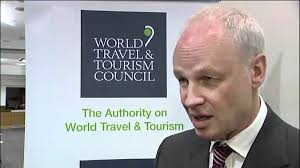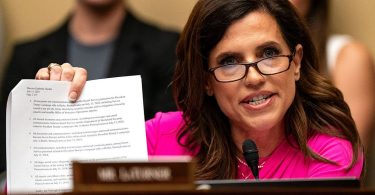David Scowsill is president and CEO of the London based World Travel & Tourism Council, an organization claiming to represent the global private travel and tourism industry. According to WTTC it is the authority on World Travel & Tourism.
WTTC works in tandem with the Madrid based United Nations World Tourism Organization (UNWTO) representing the government sector as a United Nations agency.
Mr. Scowsill today presented a speech at the IGLTA Annual Global Convention in Cape Town, South Africa. IGLTA stands for: International Gay, Lesbian Travel Association.
It’s significant to have this conference in South Africa. South Africa is the only country in Africa allowing same sex marriages and guaranteeing equal rights to their LGBT community.
In most other parts of the continent criminal penalties punish same sex activities and discrimination against LGBT travelers and citizens is openly accepted.
The LGBT travel community had big hopes to get a push from WTTC at their conference in Cape Town today. Delegates traveled from all corners of the world to listen to leaders like David Scowsill and welcomed him with open arms.
It is of course significant for the WTTC president to attend such an event. No press releases were released by WTTC, so it was a quiet exercise, but David showed up. The audience in Cape Town was anxiously waiting to hear how LGBT travel is seen by WTTC and to learn about upcoming and current policies in regards to equality by the world body and world leader of the private global travel industry.
Instead this audience listened to a speech mentioning global challenges like terrorism, but in no way was LGBT the focus.
The audience was waiting to hear on how WTTC can help to stop open discrimination and fear for members of the LGBT community to participate and enjoy global travel and tourism activities. Unfortunately this was not addressed by Mr. Scowsill.
David did not recognize the enormous economic potential LGBT travelers contribute to the industry his organization represents.
The WTTC boss clearly separated himself from the audience and talked about “our issues” compared to “your issues”.
Annebeth Wijtenburg, Communications Manager of WTTC confirmed this policy of non inclusiveness. She told eTN: “We are currently looking at adopting a position on LGTB. As part of our Freedom to Travel strategy we encourage travel facilitation for all travelers, however we have not spoken out about LGTB specifically and therefore would be unable to provide you with a comment.”
Thomas Roth, President of Community Marketing and Insights, a San Francisco based LGBT research company listened to the speech. He told eTN: “Very nice generic speech. A few mentions of LGBT but nothing of specific WTTC action.”
WTTC just concluded their annual summit in Dallas, Texas, United States. WTTC did in details discussed in Texas women equality, however LGBT equality in tourism was not on the agenda.
Perhaps one only needs to follow the money to understand why.
WTTC welcomed at their summit in Dallas WTTC members including the leader of the Supreme Commission of Tourism from Saudi Arabia. A main sponsor was WTTC member Etihad Airways, the National Carrier of the United Arab Emirates. Ministers of tourism from many African countries attended the Dallas summit.
At the same time CEO Bill Marriott whose company is known to go the extra mile and includes LGBT travelers everywhere was a sponsor and speaker at the WTTC summit.
It appears the WTTC leadership is sitting in between a rock and a hard place when it comes to LGBT.
It may be a long way before world bodies responsible for tourism (UNWTO, WTTC) can signal equality and acceptance of the gay, lesbian, bisexual and transgender traveler.
This is a transcript of the speech delivered this morning by the WTTC CEO
Good morning everyone, thanks once again for giving me the honor of addressing the IGLTA.
People often ask me how WTTC can help the LGBT sector. And in this regard, your issues are the same as our issues – principally the ability to travel freely and to enjoy the holiday of your choice, whenever you like and with whoever you choose. We call this Freedom to Travel.
It was only last week that we held our big annual event, the WTTC Global Summit in Dallas, Texas. You were ably represented by Richard Gray, appointed yesterday as your Vice Chairman.
We were holding our annual Summit in the United States for the first since we were in Las Vegas in 2011. That Summit had proved instrumental in helping to convince the Obama administration that it needed to adopt a different attitude towards its Travel & Tourism sector. To see it as an economic generator rather than a security threat.
But familiar issues have re-emerged. The twin threats of global terrorism and an international refugee crisis are creating a very real threat to our desire for Freedom to Travel.
We understand that governments are grappling with the question of how we keep our borders safe and open to business travelers and tourists.
But it is critical that they do not over-react. We have made huge strides in the last few years, right across the world, to encourage countries to adopt electronic visas and visa waiver programs.
The declaration from our Global Summit in Dallas is that we cannot give up everything which the sector has worked so hard to achieve. We must work ever more closely with governments.
I will return to this subject in a few minutes, but first I would like to talk about the scale of the Travel & Tourism sector globally. For although we are one of the world’s biggest employers and creators of economic growth, we don’t always act like it.
Globally we generate nearly 10% of GDP, $800 billion of investment and nearly 6% of the world’s export dollars.
This year, the sector supported 284 million jobs, which equates to about 1 in 11 jobs on the planet.
More than one billion people cross international borders each year. They see friends, do business, take holidays; they live, work and experience other cultures and countries.
And this sector grows at a rate faster than global GDP, and most other industries such as automotive and financial services. Within 10 years we will contribute 11% of global GDP, and one in 10 of all jobs.
By 2035 over two billion people will cross international borders each year.
Ladies and gentlemen, the sector which we represent is critical for economic growth. That is why governments should focus on us, as they deal with a falling oil price, a struggling economy, or worryingly high unemployment.
But apart from the economics argument, there is a more human side to what we do.
The 284 million jobs supported by our sector represents employment. This could be a family lifted out of poverty, a man or woman engaged in the workforce for the first time, an employment opportunity in a beautiful but remote setting. We help to promote self-respect, self-confidence and, importantly, self-sufficiency.
Across all elements of society, in every country, Travel & Tourism remains a force for good in the world.
<!– ETNRANDOMINARTICLE [javascript] –>
<script type=”text/javascript”>
var rnd = window.rnd || Math.floor(Math.random()*10e6);
var pid202761 = window.pid202761 || rnd;
var plc202761 = window.plc202761 || 0;
var abkw = window.abkw || ”;
var absrc = ‘http://ab165606.adbutler-chargino.com/adserve/;ID=165606;size=300×250;setID=202761;type=js;sw=’+screen.width+’;sh=’+screen.height+’;spr=’+window.devicePixelRatio+’;kw=’+abkw+’;pid=’+pid202761+’;place=’+(plc202761++)+’;rnd=’+rnd+’;click=CLICK_MACRO_PLACEHOLDER’;
document.write(‘<scr’+’ipt src=”‘+absrc+'” type=”text/javascript”></scr’+’ipt>’);
</script>
So all of us here at IGLTA should be proud and humbled to say that we play our own distinctive part in one of the world’s great sectors – a driver of economic growth and job creation. A driver of social inclusion and personal mobility.
It is the role of WTTC to tell these two stories about the social and economic impact. We advocate on behalf of the industry by voicing our collective needs to government. Together with Taleb Rifai at UNWTO, we have visited with 82 heads of state in the last four years.
But particularly, we use the strength of our members, to tell the world about the huge economic and social benefits of the Travel & Tourism sector.
From airports to airlines, car hire to cruise lines, hotels to tour operators, travel agencies to technology suppliers, WTTC’s Members represent every major sector in every part of the world. Our Members are the Chairs, Presidents and CEOs of these organisations…. When we speak…. we speak with the authority bestowed upon us by over 140 of the most influential people in our sector.
When we survey the wider political and economic landscape, there are three mega themes which will continue to dominate the sector, globally and regionally, for many years to come.
We see the need to work with governments to ensure that their policies create business environments which are conducive to the growth of the sector.
This means creating tax regimes which allows the private sector to be competitive. Tourism is taxed more highly than many other sectors in different parts of the world, and WTTC research proves the damaging effect this can have on the growth of our sector.
This means planning and building infrastructure, that will be capable of absorbing the incredible growth in travel that we will see over the next 25-30 years.
This means training and recruiting the right people with the right skills to meet the growth of the sector.
Everyone in this room and beyond to every corner of our sector has a huge responsibility for safeguarding the environment, and ensuring that the growth of our sector is managed responsibly and sustainably.
Our sector is growing by over 4% a year which means by 2035 the number of international travellers will have doubled to 2 billion, while billions more travel domestically.
This growth in Travel & Tourism will bring about enormous social and economic development across the world. But we have a serious responsibility to ensure that we decouple the growth of the sector from its impact on our environment, to ensure that tourism can continue to contribute to socio-economic inclusiveness and development in the long term.
This campaign calls for improved visa processes in order to allow tourists to cross international borders as efficiently as possible, while still respecting the rights of sovereign states to manage security and immigration concerns.
It is this very freedom which is most under threat in our sector.
The last few months have seen an unprecedented number of terrorist attacks, many aimed deliberately at tourists, which brings the understandable call to make our borders stronger.
But given our vast economic and social importance, we return to the question I posed earlier: “how can we keep our borders safe, while keeping those same borders open to travellers and tourists?”
This is a global problem with a global solution which will involve an increased level of data sharing, technological advancements in the form of biometrics. It will require unprecedented international cooperation.
Governments are looking to us to help them solve the problem. So it is up to us to lead the debate – to be part of the solution.
Ladies and Gentlemen: The theme of our Global Summit in Dallas was Travel Beyond Boundaries.
When I look around the world I see incredible opportunities for social and economic advancement.
I see a sector that is growing at a higher rate than world GDP. One that is creating jobs. And one that is committed to the stewardship of the world’s natural resources.
Yet I also see that the boundaries which we are trying to remove, become the barriers that others are trying to build.
So it is our role as leaders of Travel & Tourism organisations to champion the positives and confront the problems.
It’s about leadership. And that leadership starts here.
Thank you.






